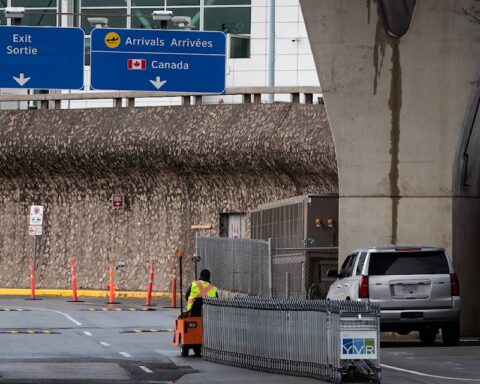In November last year, Gunwant Singh Atwal got some welcome news. Singh Atwal, a student at Cape Breton University pursuing his degree in Healthcare Management, learned that the federal government would lift the work cap limiting international students’ ability to work more than 20 hours per week for one year.
Since arriving from his native India in September last year, Atwal had faced challenges in finding a job. Figures from Cape Breton University’s website show that the school had 8,517 full-time students last year – up more than 3,100 compared to the previous year – a figure largely due to international student enrollment.
The figures further show that of the university’s 9,100 full-time and part-time students, about 76 per cent come from abroad. This surge in numbers made housing and employment opportunities in Sydney even more competitive for students like Singh Atwal seeking to work while completing their studies.
Up until November 2022, full-time international students in Canada were not allowed to work off campus beyond the 20-hour-per-week limit. However, that changed due to a pilot project introduced by former Immigration Minister Sean Fraser to help fill labour gaps across the country. The policy change helped Singh Atwal to eventually find a full-time job at a call centre in Sydney in February.
“Since the work hours changed from 20 to 40, the call centres were able to expand more and hire more students like myself,” he says. “That took the pressure off.”
“It was only once I got my full-time job that I stopped dipping into my savings…When I finally got that paycheque, when I was above the red, I was quite happy.”
According to Singh Atwal, the lifting of the 20-hour work cap has allowed him “to not be so stressed anymore about rent and food, because I’m able to cover them by myself.”

Meanwhile, in an emailed statement to New Canadian Media, Immigration, Refugees and Citizenship Canada (IRCC) said the lifting of the 20-hour work cap is currently under review: “IRCC is in the process of assessing the impact that this public policy has had, including how many eligible international students have taken advantage of the temporary public policy.”
“The temporary lifting of the 20-hour limit for off-campus work is helping to address Canada’s labour shortage, and provides an opportunity for students to have a fuller workplace experience while they study. IRCC continues to engage with provinces, territories and stakeholders to ensure Canada is well positioned to attract and retain international students, who make significant contributions to our communities economically, socially, and culturally.”
IRCC did not specify when students will know if the policy has been extended.
The lifting of the limit has allowed more than 800,000 international students to access more part-time jobs while offering them a pathway to more full-time work, according to figures from IRRC last year. While the previous cap excluded on-campus work and summer jobs, advocates say it hampered international students’ ability to gain valuable work experience in Canada — a critical step towards qualifying for permanent residence.
With the pilot project now set to expire on Dec. 31, 2023, international students are scrambling for ways to fund their studies and daily living expenses when housing and food inflation are at record highs.
The limits of the cap
The Canadian Alliance of Student Associations (CASA), an advocacy group representing Canada’s post-secondary students, recently released a report called Reframing the Future: A Strategy for Student Talent and Quality of Life, which suggests the 20-hour-per-week policy not only limits international students’ potential work opportunities but puts them at risk of losing their study permits if they are caught exceeding the cap.
Mateusz Salmassi, CASA’s Director of Advocacy, says Canada is “shooting itself in the foot” by making this move amid a labour shortage crisis.
“We see the policy causing major anxiety, from coast to coast to coast. International students went from having very limited options when it came to participating in the labour market to suddenly having the ability to take on an extra shift if they needed to pay the higher bills and pay for the cost-of-living crisis that they’re facing. But now, the students are at risk of losing the lifeline that they got from the temporary lifting of these work limits.”
Salmassi further suggests that permanently lifting the cap would help reduce workplace exploitation and abuse, which can take place when international students work longer hours without protections in place: “When faced with challenging financial choices, many students may lean towards working under the table for cash where they’re far more vulnerable to exploitation.”
Student advocates are also concerned that reverting to the old policy could limit the ability of international students to gain valuable work experience. The previous cap required students to apply for a separate co-op work permit, which can cost $155 per application and take up to five months to process, creating further uncertainty for students as well as employers.
But others have questioned why international students have to take on full-time work in the first place. Graham Barber, assistant director of international relations at Universities Canada, an organization representing universities across the country, says his organization wants to see international students have more ability to balance their work and studies: “We’re not sure if 40 hours per week is the right number, and we don’t think 20 is the right number either. It falls somewhere between the two. We really need to make sure students have a balance of both work and academic experience while recognizing the affordability issues they’re facing across the country.”
Barber says the solution may lie in more integrated work-learning opportunities which can ensure international students gain valuable work experience as part of their academic programs. Ultimately, he says he prefers to see integrated learning instead of seeing international students working multiple jobs or full-time jobs at once to alleviate their financial stress.
The pay-off for students
Singh Atwal says he has benefited a lot from the temporary lifting of the work cap. Only months working at the call centre, he was able to get promoted to a supervisor position in June. That makes the policy move particularly high stakes for him: “As a supervisor, you need to be working full time because it’s a whole team that you’re handling. With these changes in December, I won’t be able to do this work anymore, and that’s the case for a lot of the other team leads too.”
He adds it would also help him cope with any shifts in expenses: “If I went back to working 20 hours consistently and if any surprise expense was to come up like my laptop broke or my rent increased or food got more expensive, all of those would affect me even more. And that would be more disastrous.”
Katrya Bolger is a Thai-Canadian journalist. She writes about how national politics and policy impact Canada's immigrant communities. Since starting her career as a sub-editor for the Bangkok Post, she has spent over seven years writing and editing for various newspapers, magazines and non-profit organizations in Canada and abroad. Her written work has appeared in publications such as The Globe and Mail, Montreal Gazette and The Walrus.







Please tell us how can we show support for the policy of unlimited working hours for international students. Want to show support for this temporary policy to be made permanent. Writing letter, sharing, calls, campaigning, marching, etc?
Lifting the 20-hour cap is deemed necessary. The 20 hour work, given the living expenses, is not enough even for fulfilling life reuirements of two weeks. As a graduate student of a 4-year program, working freely for this year has not had any negative impact on my academic status. Rather, I was motivated enough to move on forward to keep my research ahead first along with GPA of A (i..e, excellent). It is high time that we took a stand to stand – stand together in order to live. As simple as that, ‘TO LIVE”.
You may tell me, “You stated that you are responsible for covering your fees and living expenses when applied for the study visa.” You are right! I have been in Canada since 2021, never complained. But life changes, given my mum got cancer, and we are going bankrupt for this – nothing to say about economic recession and labor shortage in the country. Wish you not pass through such awful things but happiness!
If worse comes to worst, I would complete my research away from university because it is impossible at all means to handle and cope up with the expenses. A sad thing, if happnes, to be away from university and the collegial atmosphere.
Canada has always been the best; people have always been nice. Words get paralyzed, and we believe that lights will bloom with good news very soon!
We ALL Deserve Better Than That!
Thanks for taking our international student concerns to the government.
Given the ridiculous price hike in rent and inflation, this cap lift has helped pay for our basic expenses and helped us get jobs suited to our calibers. I came to Canada in 2021 and initially worked 20hrs and it wasn’t that bad at that point given that my rent was a little less and grocery prices were not so ridiculous. However, with time, the landlords got greedy and started increasing the rents left to right, making it difficult to continue with the 20 hr limit. Yet, I was able to save enough in summer and then when this announcement came for the cap lift, me along with hundreds and thousands were relieved. However, if they reinstate this cap, I don’t think my current job will let me switch to part time and not everyone will have enough jobs suited to a strict 20hr schedule. I have heard students take in cash jobs, but that’s a loss project as the govt won’t be making taxes off it and I have heard some horror stories about employees taking advantage of those students.
All in all, extending the cap lift is a win win for both the students and the government. As for the quality of studies, my cgpa has not fallen even a little bit with the extra work, and I know a lot of other students are doing great too knowing that we don’t have to fret so much about rent right now.